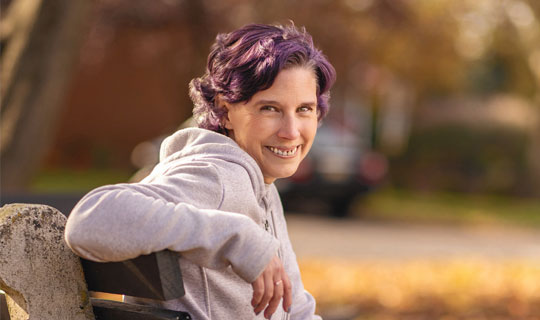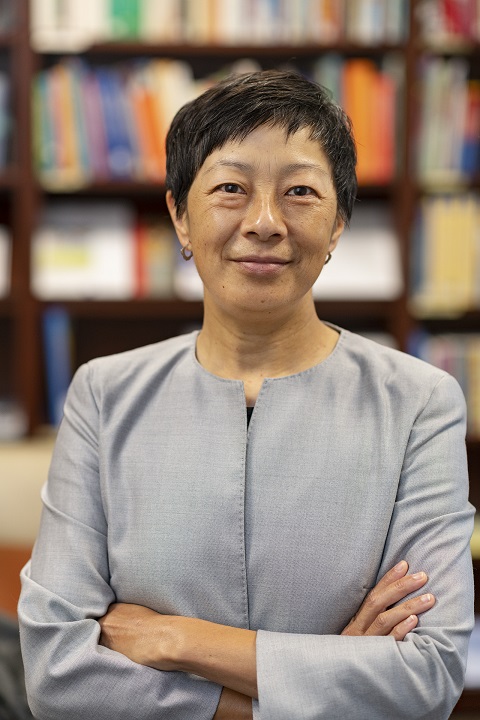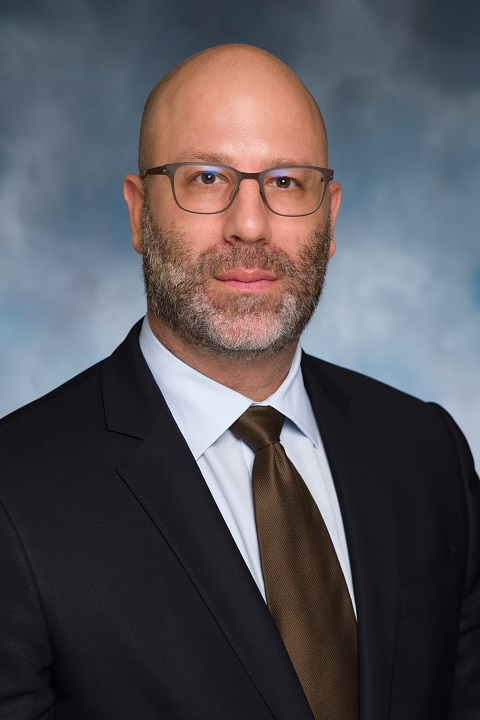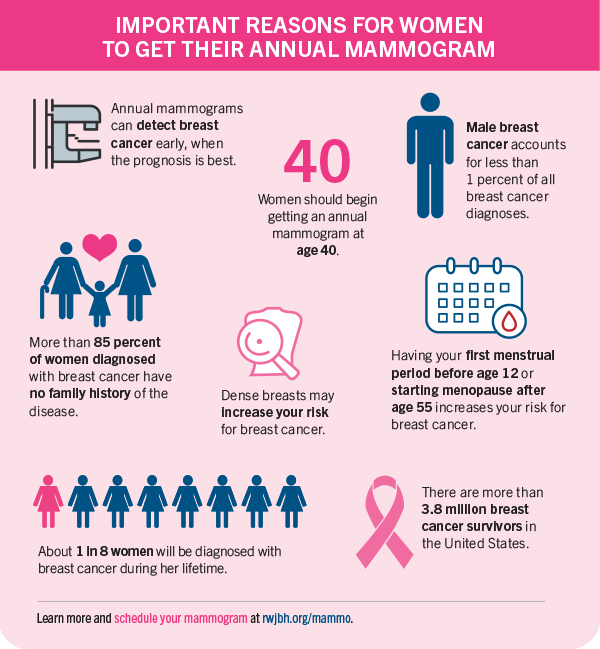“The good news is that everything worked out pretty much how I told them it would.”

A woman survives late-stage breast cancer thanks to leading-edge therapies.
Erin Buchalter remembers the day she noticed a lump in her right breast. “One day it was normal, then one day it felt rock-hard—like a large baseball had taken over my breast,” she says. “I never noticed anything in between; it happened so quickly.”

It was spring 2021. She was working as a party server at a restaurant, carrying heavy trays on her right side. “I thought it was a muscle strain,” she says. “Cancer crossed my mind, but I thought, ‘No way. Cancer doesn’t grow this fast.’”
Erin assumed the lump would go away and initially took no action. Having recently moved back to New Jersey, her home state, she didn’t have a primary care physician.
But over time, the lump changed shape, dimpling her skin. Unable to ignore it any longer, she saw a doctor and had a breast biopsy. She was diagnosed with stage 3 breast cancer, an advanced disease that is considered curable with aggressive treatment but often recurs.
Facing this dire diagnosis, Erin’s first thoughts were for her adolescent daughter and son. “I’m a single mom, and they’re my whole world,” she says. “From day one, I told them: ‘I’m going to be fine. I am not leaving you without a mother.’ I had to believe that.”

Seizing an Opportunity
After looking into health care options with help from her father, Erin chose RWJBarnabas Health in partnership with Rutgers Cancer Institute, the state’s only NCI-designated Comprehensive Cancer Center, to provide state-of-the-art care. In May 2022, she saw breast surgical oncologist Cynthia Lee, MD, at Robert Wood Johnson University Hospital (RWJUH) Somerset, an RWJBarnabas Health facility. “Dr. Lee said I was not yet a candidate for surgery—the tumor was too large to remove,” Erin says. “I needed chemotherapy to try and shrink it.”
The impact of receiving care at RWJBarnabas Health quickly became evident. Erin had access to a nationwide clinical trial called I-SPY 2, she learned from medical oncologist Mridula George, MD, Associate Program Director of Breast Medical Oncology at Rutgers Cancer Institute.

“Many patients like Erin enter the trial to shrink their tumors and become eligible for surgery,” Dr. George says. “The trial uses the molecular subtype of the tumor to assign novel drugs that have shown early benefit.”
Erin jumped at the chance. “It offered the opportunity to receive the latest treatments being tested,” she says.
Her chemotherapy consisted of a combination of drugs, including some that are typically given intravenously but which she could take orally as part of the clinical trial. She also received immunotherapy.
The treatments achieved their goals: Erin’s lump became smaller, and her skin improved. She would now be a candidate for surgery once she recuperated from chemotherapy side effects and regained strength.
Multiple Methods
Erin received a skin-sparing mastectomy in December 2022 from Lindsay Potdevin, MD, a breast surgical oncologist at RWJUH Somerset and Rutgers Cancer Institute. The surgery preserved skin that had improved due to chemotherapy.

Chemotherapy also had significantly improved nearby lymph nodes so that fewer of them needed to be removed during the procedure. “This typically leaves patients with less chance of developing lymphedema [fluid buildup], improving their quality of life,” Dr. Potdevin says. Of five lymph nodes removed, one had a small area of cancer.
Not a candidate for standard breast reconstruction with an implant, Erin instead received a DIEP (deep inferior epigastric perforator) flap reconstruction, which uses abdominal skin and tissue, from Richard Agag, MD, Chief of Plastic and Reconstructive Surgery at RWJUH in New Brunswick.
After the eight-hour procedure, “I didn’t need to take any pain medication,” Erin marvels. “And I was more than satisfied with the appearance of my breast.”
Due to her advanced disease and lymph node involvement, another step in her treatment remained: radiation therapy. Instead of using traditional photonbased radiation therapies such as X-rays, Bruce Haffty, MD, System Director of Radiation Oncology at RWJBarnabas Health and Associate Vice Chancellor for Cancer Programs at Rutgers Cancer Institute, proposed using proton beam therapy.

Like photons, protons destroy cancer cells, but protons can target tumors more precisely, potentially lowering doses to nearby healthy tissue. “In Erin’s case, we found the heart and lung doses to be significantly lower with protons,” Dr. Haffty says. “That was an advantage for her.”
Erin received 25 radiation treatments over a five-week period at the Laurie Proton Therapy Center at RWJUH, one of about 43 specialized centers in the U.S. offering this therapy.
Now back at work, Erin feels increasingly better. She takes hormone therapy to reduce the risk of recurrence, and her doctors monitor her closely. “My kids are happy that things are back to normal,” Erin says. “They were scared—but the good news is that everything worked out pretty much how I told them it would.”
Important Reasons for Women to Get their Annual Mammogram

- Annual mammograms can detect breast cancer early, when the prognosis is best.
- Women should begin getting an annual mammogram at age 40.
- Male breast cancer accounts for less than 1 percent of all breast cancer diagnoses.
- More than 85 percent of women diagnosed with breast cancer have no family history of the disease.
- Dense breasts may increase your risk for breast cancer.
- About 1 in 8 women will be diagnosed with breast cancer during her lifetime.
- There are more than 3.8 million breast cancer survivors in the United States.
Learn more and schedule your mammogram.
Learn more about breast cancer care at RWJBarnabas Health.
RWJBarnabas Health, in partnership with Rutgers Cancer Institute—the state’s only NCI-designated Comprehensive Cancer Center—provides close-to-home access to the most advanced treatment options. To schedule an appointment with one of our cancer specialists, call 844.CANCERNJ or contact our Cancer Centers.
 View full issues of Healthy Together magazine by New Jersey region:
View full issues of Healthy Together magazine by New Jersey region: